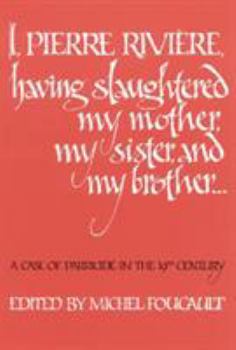I, Pierre Riviére, Having Slaughtered My Mother, My Sister, and My Brother: A Case of Parricide in the 19th Century
Select Format
Select Condition 
Book Overview
To free his father and himself from his mother's tyranny, Pierre Rivi re decided to kill her. On June 3,1835, he went inside his small Normandy house with a pruning hook and cut to death his mother, his eighteen-year-old sister, and his seven-year-old brother. Then, in jail, he wrote a memoir to justify the whole gruesome tale. Michel Foucault, author of Madness and Civilization and Discipline and Punish, collected the relevant documents...
Format:Paperback
Language:English
ISBN:0803268572
ISBN13:9780803268579
Release Date:December 1982
Publisher:University of Nebraska Press
Length:288 Pages
Weight:0.70 lbs.
Dimensions:0.7" x 5.3" x 8.0"
Customer Reviews
4 ratings
A Battle of Discourses
Published by Thriftbooks.com User , 17 years ago
The reason Foucault is not attempting to interpret Riviere's deeds is NOT to show simply how "people respond to a crime", as a previous reviewer put it. By publishing this collection of texts, Foucault was attempting to recover the struggles and plays of forces between juridical and psychiatric discourses in their attempt to make sense of the murders and the murderer. The legal and psychiatric discourses attempt to envelop Riviere's own account of his deeds in various power relations (mainly by marginalizing Riviere's voice as either that of a parricide or that of a madman). Had Foucault interpreted Riviere's deeds, he would have subjected them to strategies similar to those employed by the medical and legal experts. This is a fascinating collection (don't skip Foucault's introduction though!), but a reader would definitely appreciate it more after reading Discipline and Punish or "Two Lectures" in Foucault's Power/Knowledge.
Against Interpetation: The Bald Man Pleads Indecision
Published by Thriftbooks.com User , 22 years ago
Okay, the reason why Foucault did not interpet the reasoning behind the crime was because the issue of guilt or innocence was not his topic. He was more interested in how people treat crimes and approach the issue of criminality.It is not Riviere who is at trial *again* in Foucault's book, but rather it is a trial described, which could be any trial. A crime after the fact is a story, a memory for those who were involved, but we all become involved in an event as if it were a story we have heard before. What other way to approach a murder that is to us words and the heaving bosom of a witness, the placid tension of the accused? We confront a forced performance with confused or feigned characterizations.Yet even said, this is not Foucault, nor what Foucault was reaching for. All Foucault does is show how people act in response to crime and reveal the obvious ploys that repeat themselves throughout history, because the story that composes our lives has not died.And if a man approached you with a mark on him, and claimed to have killed his brother, and the soil did cry out to you, would you raise your hand against him?This book is a good accompanyment to his work Discipline and Punish.
Fascinating Story--Not Enough Analysis
Published by Thriftbooks.com User , 23 years ago
The story of the young Frenchman who murdered his family is a fascinating piece of documentary work by Foucault and his student assistants. However, I would have liked to know much more about how they interpret this "unusual" behavior.
A fascinating and enlighting read.
Published by Thriftbooks.com User , 25 years ago
First don't be mislead Foucault has a paper in this work, but acts as editor not author. Having said that, it is another great work by Foucault.





